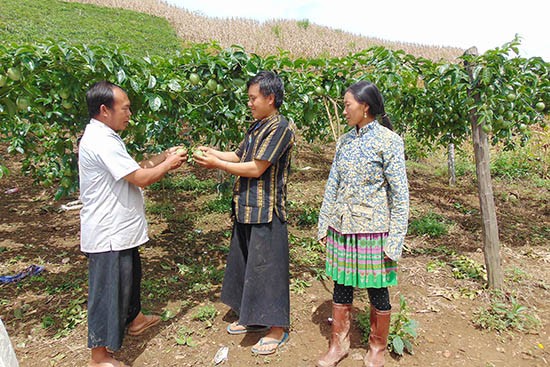(VOVWORLD) - Border communes in Phieng Cai hamlet, home to Mong ethnic people, in Moc Chau district, Son La province, have greatly changed. These days they have a variety of services, shops, and even high-rise buildings. Roads connecting communes and villages have been paved, making travel easier. The green of pomelo, orange, and longan trees and fields of corn and tea covering the hillsides reflects the growing prosperity brought by a restructuring of crops and animal husbandry.
 Growing passion-fruit or plum trees on the slopes has resulted in high economic efficiency. Growing passion-fruit or plum trees on the slopes has resulted in high economic efficiency. (Photo: baosonla.org.vn)
|
Trang Lao Tu, head of Phieng Cai’ Fatherland Front, told VOV that his family is one of many in the hamlet who have escaped poverty and become well-off by raising cattle and growing fruit trees on the hillsides.
He said the villagers enjoy a better life now because leaders at the grassroots level meet with them weekly, and visit every alley to explain state policies and encourage people to follow the policies and work hard.
“Pursuant to the Party guidelines and State laws, our life has gotten better. Our children have opportunities to attend school and have sufficient food and clothing. Any family that doesn’t follow the state guidelines will not grow rice and corn, and, of course, will not have a food reserve,” said Tu.
All 88 households in Phieng Cai are ethnic Mong who live mainly by farming. Nearly half of the 100 hectares of farm land are used to grow upland rice and the rest is planted in corn.
In order to persuade them to plant new high-yield varieties, many meetings have been held with the villagers and the heads of clans to conduct surveys on fruit tree planting.
Tu said that thanks to those training and experience sharing sessions, the villagers have changed their way of thinking about crop restructuring and growing fruit trees on the slopes.
The commune police have enlisted the most prestigious local people to disseminate state policies and explain to people better ways to approach their work.
Captain Ha Van Trong, Deputy Head of the Long Sap commune police, said the meetings have succeeded in getting people to follow state policies.
“We’ve focused on persuading people to stay away from drug abuse. If anyone resists abiding by the law, we spend extra time explaining to them how to improve their financial situation,” Trong explained.
Moc Chau district’s Party Committee has promulgated a directive on strengthening public security and order in its 10 most difficult border villages, including Phieng Cai hamlet.
Pham Thi Nhung, Deputy Secretary of Moc Chau district’s Party Committee, said the district has taken drastic steps to improve people's lives and ensure public security and order.
“We’ll continue to combine the implementation of socio-economic development policies and bolstering national defense and security. We’ve set annual and 5-year goals for socio-economic development. Working teams will conduct reviews and help each household make progress,” said Nhung.
Most households in Phieng Cai hamlet grow passion-fruit or plum trees or raise cattle or poultry. Their hard work has resulted in bumper harvests.
The authorities of Long Sap commune has proposed that Moc Chau district build a processing plant to process all locally grown farm produce.
In the short term, Long Sap plans to establish cooperatives to sell local produce and in the plan until 2025 will focus on restructuring crops to include more passion fruits and tea.